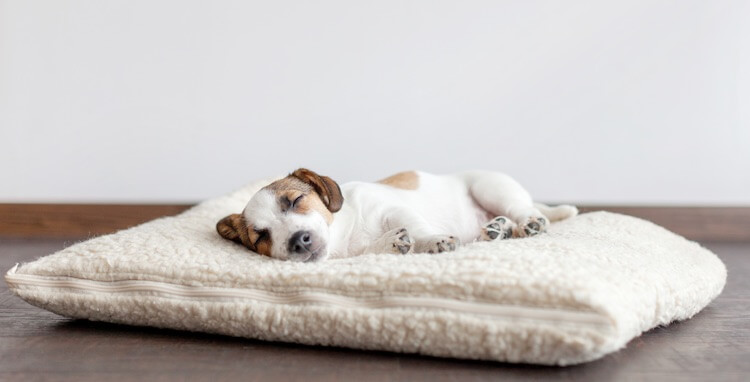As a new puppy parent, it can be difficult to know how much sleep your four-month-old pup should be getting. With all the other puppy related activities that may be going on, such as housebreaking, obedience training, and socialization, it may seem like there’s not enough time in the day to get everything done. However, balancing your pup’s sleep schedule is an important part of their growth and development. It’s important to ensure that your pup is getting the right amount of restful sleep in order to thrive. In this blog post, we will discuss the recommended amount of sleep for a four-month-old puppy, why it’s important, and some tips for getting your pup the restful sleep they need.
Clubs Offering:
Despite being little balls of energy, puppies typically sleep 18 to 20 hours per day. Your puppy may be a tiny tornado one second and then fall asleep peacefully in the middle of a dash. The necessary development of his central nervous system, brain, immune system, and muscles depends on sleep for healthy growth. He also benefits from all that sleep by resting during growth spurts.
Puppies expend a lot of energy when they are awake because they are developing physically, meeting new people, and discovering what they are capable of. They won’t always pay attention to an internal clock telling them it’s time to rest because the world is such an interesting, stimulating place. You can assist by adhering to a few straightforward rules for daily bedtimes and naps.
How much do puppies sleep?
Puppies are entirely dependent on their mothers when they are born. They essentially have no hearing, sight, or control over their muscle movement. They sleep for 22 hours per day, or roughly 90% of the time, and then nurse for the remaining 10%. Lucky pups!.
Puppies sleep less and explore the world more as they grow. Your dog’s sleep requirements will depend on their breed, age, diet, and level of activity, but here is a typical overview:
A puppy will sleep for about 20 hours a day at 8 weeks of age.
By the time it is 10–12 weeks old, puppies sleep 18–20 hours every day.
A puppy will sleep for about 18 hours a day between 14 and 16 weeks.
This period, between 16 and 18 weeks, is crucial for your puppy’s development. They must master their feeding routine, socialization, and fundamental training during this crucial period, to name a few. They need a lot of sleep for their new routines and behaviors to stick.
Puppies and older dogs will adjust to 12 to 14 hours of sleep per day. If you’re curious about where your dog falls on the dog age chart, check it out here.
Puppies take 30-minute to two-hour naps spaced out throughout the day and night. Young puppies will nap more frequently, frequently every hour. As they grow, frequency of nap time will dwindle.
Dogs are polyphasic sleepers, which means they nap or sleep for short periods throughout the day and night. As dogs age, they become diurnal sleepers, which means they sleep for longer periods during the darker parts of the day, with naps and activity happening during daylight hours.
Humans are monophasic sleepers, meaning we sleep during the night, and night alone.
Because they develop their bones and muscles more slowly than small dog breeds and need more sleep to do so, large dog breeds get tired easily. Additionally, they need dog food made specifically for large breeds to nourish those rapidly developing bodies.

Why Is Sleep Important For Puppies?

Returning to Dr. Manaceine’s study, she found that sleep deprivation significantly affected the puppies’ brains. In the absence of sleep, fat degeneration, blood vessel abnormalities, and hemorrhaging occurred.
The brain is the command center for the nervous system. It is divided into three main sections:
We know how a diet limited in lipids can detrimentally affect the brain and contribute to neurological disease, but sleep deprivation had a worse impact on these puppies.
Sleep is essential to your puppy’s vital functions. It contributes to disease, immune system regulation, energy conservation, brain waste removal, cognition, performance, and psychological state.
Many studies since Dr. Sleep deprivation during a puppy’s development has been shown to cause reduced brain mass, neuronal death, and subsequent behavioral issues. Cancer and type II diabetes cases in puppies are also exacerbated by poor sleep.
Sleep is essential to your puppy’s life. Without it, the control center—their brain—is severely impacted, which can result in a number of subsequent health issues during their formative years.
Puppies develop much faster than a comparable human child; for instance, an average 7-week-old puppy is just as advanced as a 9-month-old human baby. According to breed, a dog is considered fully mature between the ages of 1-2.
Sleep is necessary for a puppy’s cognitive changes, emotional challenges, and physical transformation for them to mature (both healthily and happily). Puppy brains use sleep to process the day’s lessons. Whether it’s a fresh trick or just to stop chewing on the chair legs,

Puppies spend the majority of their first two months sleeping due to the enormous amount of developing they need to do in such a short amount of time.
In a lab setting, adult dogs who are left alone typically sleep for about 13 hours per day. Dogs are diurnal, meaning they are awake and active during the day.
Puppies can sleep for anywhere between 18-20 hours per day. In the morning, there will be more activity, followed by a rest, and then there will be less activity around noon and into the afternoon.
Typically, they will go to sleep after playing, learning a new skill, going for a walk, or having just had a meal.
The experiences that your puppy has during the day can affect the type and quality of sleep they have. Studies have found that after a negative experience, puppies will fall asleep more quickly. This is known as protective sleep and is a response to high-stress levels.
Sometimes it is simple to blame an “exhausted” dog on how busy the day is. Be mindful because how they sleep may reveal more about their experiences.
New dog owners frequently impose “official sleep time” at night. It’s up to you where you want your puppy to sleep. Some owners choose to housebreak their puppy, while others are content to let them sleep in their bed.
Many puppies are adept at controlling their nap times, especially if you are utterly boring and unexciting. The most important thing is to offer your wild boy a calming activity when he needs to take a nap and to remain completely calm and silent.

Your puppy will only be awake for four to six hours a day for the majority of its life. Planning their training and socializing should take this into consideration.
Any training session should be brief; it’s crucial to avoid overwhelming them because we know that bad experiences can have an adverse effect on their development and sleep quality.
FAQ
How much should a 4 month old puppy sleep during the day?
Despite being little balls of energy, puppies typically sleep 18 to 20 hours per day.
How long should a 4 month old dog sleep at night?
Even though this might be the case, keep in mind that your puppy will typically require 8 to 10 hours of sleep per night.
How long should a 4 month old puppy be awake?
It’s important to keep in mind that puppies, like babies, require a lot of sleep. Your puppy will require roughly 18 to 19 hours of sleep every day. Therefore, plan on staying awake for no longer than 4 to 5 hours at a time.
Is it normal for my 4 month old puppy to sleep a lot?
Puppies typically sleep 18 to 20 hours per day, though exceptions to these norms are common. Like human babies, your puppy will gradually need less sleep as they age, with adult dogs sleeping an average of 14 hours per day.